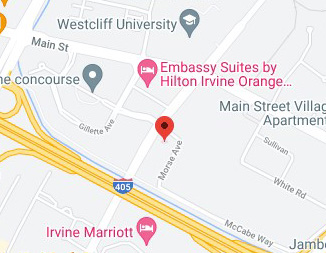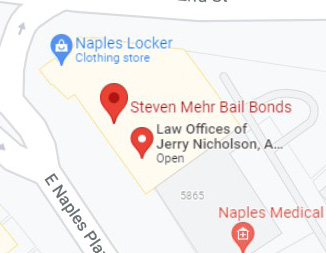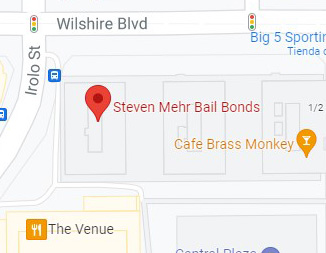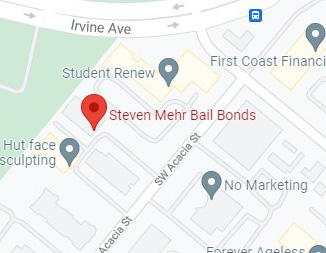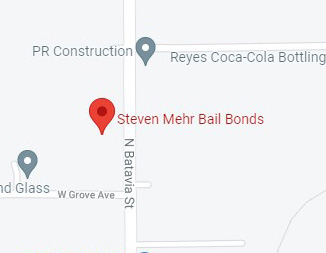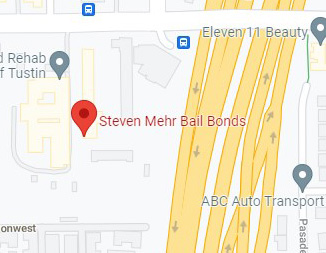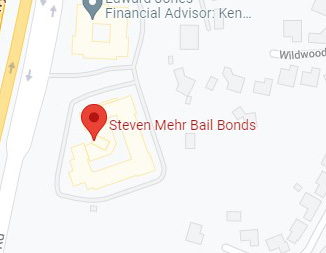Bail aims to ensure that persons charged with offenses don't flee while awaiting their trial. If you've been arrested in Glendale, you are probably asking yourself a lot of questions. What is bail? How do bail bonds differ from bail? Who is eligible for bail, and who is not? If you can't afford bail or the judge denied it, are there other options other than remaining detained? Steven Mehr Bail Bonds, an experienced bonding firm, invites you to keep reading to find answers to your question and learn how we can help you.
How Bail and Glendale Bail Bonds Work
Bail is a bond, property, or money posted directly to a court in return for the accused person's release from detention while awaiting their trial. Bail is designed to ensure you make all court appearances following your release. If you fail to show up in court when required, the court could forfeit your bail and issue an arrest warrant.
Not all defendants can raise the entire bail amount. Instead, they use bail bonds. The accused obtains the bail bonds by paying a bail bond agent a non-refundable premium (usually ten percent of the bail). The agency promises to pay the court the entire bail amount if the suspect skips bail. Since the agent becomes accountable for the bail amount, they might require the individual to put collateral to cover the potential liability. Typical collateral used includes homes, cars, stocks, and jewelry.
Bail bonds are more expensive than posting cash bail. Typically, you will pay your cash bail to a court, and it will be funded (minus the court's administration fee) once your criminal case is closed, provided you showed up in court, regardless of the case outcome. With a bail bond, you are out your premium.
However, bail bonds are ideal if you cannot afford to pay your bail or are accused of a high-profit criminal activity.
The judge sets your bail during the initial court appearance. It can be either arraignment or a bail hearing. Generally, the court uses a bail schedule as the initial stage for the bail amount. The bail schedule outlines bail amounts for typical offenses. For example, a bail schedule could require ten thousand dollars for a felony charge and five hundred dollars for a California misdemeanor.
Sometimes, the defendant might choose to pay their bail immediately following their arrest. Although the option speeds up their release, the individual will post the amount outlined on the bail schedule. They will also miss the opportunity to request bail modification. Only a magistrate or judge can reduce or increase bail.
Judges today are increasingly not using bail schedules when determining the bail amount. Instead, they rely on risk-based assessments to tell whether the defendant poses a public safety threat or will jump bail if released pretrial. The greater the public safety or flight risk, the higher the possibility of paying a considerable bail amount. Sometimes, the judge could deny bail.
The risk-based assessments consider the severity of the offense charges, previously missed court hearings, community ties, and previous criminal records. Some Glendale courts use risk assessment tools that calculate the score a judge could use to determine whether to let an accused person go and under what terms.
If you do not pose a public safety or flight risk, the judge might release you on your own recognizance. An O.R. release means you will not post bail, but the judge will impose conditions of your release.
Some of the typical bail terms and conditions include:
- Electric monitoring
- Regular check-ins and meetings with your probation officer
- Random alcohol or drug testing
- Travel limitations
- Staying away from the alleged victim(s)
- Firearm prohibitions
- An order to not violate any other law
- Surrendering your passport and driver's license
Breaking one of these bail terms might lead to your re-arrest, remaining detained until the trial date, or bail forfeiture.
What Happens If You Cannot Pay?
The law allows a bail review hearing if you cannot raise the required bail amount or a Glendale bail bond. The court will consider your ability to post bail and analyze your financial resources and responsibilities like rent and childcare during the hearing. If the judge determines you cannot afford your bail, they can lower the amount or release you on your own recognizance.
Cash Bail Elimination
Due to the arguments that there exist inequities in the judicial system, there have been movements to eliminate cash bail. Stories of suspects spending months and years in jail because they cannot raise the required bail amount have spotlighted how people are treated differently founded on their wealth in the criminal justice process.
In 2018, California lawmakers passed reforms designed to eliminate the bail bonding industry and cash bail. However, in November 2020, voters rejected all the reform measures. That means cash bail remains an option.
What To Do When a Loved One is Arrested
One of the dreadful things is learning that a loved one is in police custody. It is a difficult moment, and you might not have an idea of what to do next. Your priority should be securing their release as soon as possible, and the steps below can help you.
Stay Calm
Remain relaxed and collected; pay attention to what you should do. Forget about your disappointment and anger; your friend or family member requires a shoulder to lean on. Being supportive and concerned assures them that you will do everything possible to help them. It would help if you also understood that their worries and fears are more significant than yours. Save all questions.
If your loved one tells you of an arrest via a call, make it short and avoid discussing the arrest's details. Your phone call might be recorded. The police might use anything incriminating against them in a court of law.
Collect Crucial information
Knowing the particulars of a loved one's arrest is paramount in obtaining the release. Reach the District Attorney's office to acquire these details. Inquire about the alleged criminal charges, time and place of the arrest, arrest number, and name and location of the detention center.
If present at the crime scene, take details of the law enforcer, including the badge number and name. Ask whether they are federal or state government officers and where they will take your friend. Nevertheless, please do not interfere with their work since you could face resisting arrest charges.
Seek Skilled Legal Assistance
After gathering the required details, seek legal help by consulting with a seasoned criminal defense attorney. The legal counsel can visit your loved one in jail to understand who occurred, case facts, and advise them accordingly.
The benefit of having a lawyer is that they're experienced with the laws and can protect the defendant's constitutional rights. Moreover, they will navigate the legal practices and complex systems, assist with filing the required paperwork timely, build legal defenses, and challenge the prosecutor's evidence.
Post Bail
To secure your loved one's pretrial release, you should post bail. You can post cash bail or use your property to guarantee you will show in court in all court proceedings. If you don't have adequate money, you can contact a Glendale bail bond firm.
Consequences of Failing to Appear in Court While Out on Bail
When you pay bail, you agree that you'll show up in every court hearing until your case is closed. In exchange, the court will let you go home and return to your daily activities while you build your defense. Nevertheless, skipping bail could worsen the situation.
If you failed to attend the court as a result of a health condition or an accident, your bondsman could work with the judge to have the hearing rescheduled. However, it isn't guaranteed.
The judge might forfeit your bond and will not recover the bail posted. Also, you will be accountable for paying your agent their premium.
Skipping bail is a crime on its own. The court will charge you per Penal Code Section 1320.5 PC, depending on the underlying charge. If you skipped bail on a California misdemeanor, you could face another misdemeanor punishable by one thousand dollars in fine and a six-month jail sentence. When it comes to a felony, you will be charged with another felony. The crime attracts the following penalties:
- A year in county jail
- Up to three (3) years in prison
- A maximum fine of ten thousand dollars
If you cannot make your court appearances, you should speak with a criminal defense lawyer and the bondsman to discuss the situation. They can work with you to reschedule the hearing, prevent bail forfeiture, and stop you from being re-arrested.
What Occurs to a Co-signer If the Accused Skips Bail?
In most cases, accused persons need a co-signer to pay bail. The co-signer takes the bail's legal and financial obligations, including ensuring the defendant appears in court and complies with bail conditions. When the defendant skips bail, the bond's financial responsibilities fall on the co-signer. You would not face any criminal charge as a co-signer unless you assisted the suspect in missing their court hearing. In that case, you might pay civil fines.
However, you have available options. If you believe the accused will not make a court appearance, you can contact the court and the bail bond agency to terminate your Indemnitor agreement. It could mean that the bail will be revoked and the defendant returned to court. If you are aware of a fugitive's whereabouts, you should call the agent immediately to ensure they are taken into police custody safely.
What Occurs During Booking
Booking provides information about people brought to police custody. Since it creates the arrest record, you cannot be released until after this process is done, irrespective of whether you can post your bail immediately.
The process can take hours. The duration depends on:
- The number of booking procedures to be conducted
- The number of the available law enforcers
- How many suspects are waiting to be booked
Common steps in the process include:
- Recording your name and the alleged crime committed
- Taking mug shots — A mug shot could assist in establishing your physical condition during the arrest. Your physical condition can be vital to urge that the police used illegal force when arresting you or whether you were involved in a quarrel before your arrest. Also, it can play a significant role in determining which of the persons bearing the same name was detained.
- Taking your property and clothing — The police should return any item taken from you once released unless they are part of the crime's evidence.
- Taking fingerprints— Comparing fingerprints at the crime scene and those in the police database aids the law enforcers in identifying the actual perpetrator of the crime.
- Performing a full-body search — To prevent drugs and firearms from getting into jail, the officers require you to strip and submit a body search.
- Checking for arrest warrants — The officer will check whether you have other criminal charges pending. Individuals with pending warrants aren't released on Glendale bail.
- Health screening —The police might conduct blood tests and diagnostic imaging to ensure the safety and health of other inmates and jail officials,
- Acquiring details appropriate to incarceration conditions — The official might ask you about gang affiliation to lower the possibility of injuries and violence. You might be taken to one section of the detention center or placed in protective custody, depending on your answer.
- Taking DNA samples
Glendale Police Department, Courthouse, and Jail Contact Details
Glendale Police Department
Phone: (818) 548-4840
Glendale City Jail
Glendale City Jail is a ninety-six-bed correctional facility operated by the Glendale Police Department. The facility serves women and men arrested in the Glendale area accused of both felonies and misdemeanors. The detention center is situated approximately nine miles north of downtown Los Angeles. Its phone number and address is:
Phone: (818) 548-3124
Also, you can contact the L.A. County inmate information phone line at (213) 473-6100.
Visitation happens every afternoon between 1:00 p.m. and 4:00 p.m. Inmates are allowed up to two fifteen-minute visits daily, with one individual allowed to engage in per visitation appointment.
Glendale Courthouse
Phone: (818) 265-6400
The courthouse is open between 8:00 a.m. and 4:30 p.m., and the Clerk's Office is open from 8:00 a.m. and 4:30 p.m., Monday through Friday, except for court holidays.
Find a Seasoned Glendale Bail Bond Agent Near Me
Securing your loved one's release can be paramount, particularly if it can affect the capability to provide for their family, work, or have a good name. Bail allows you to live your life normally while building your criminal defense while awaiting trial. Steven Mehr Bail Bonds can assist you in posting Glendale bail bonds promptly. We offer bonds for different types of criminal charges at pocket-friendly rates and flexible payment plans. Please get in touch with us at 800-834-8522 to learn how we can help you.





